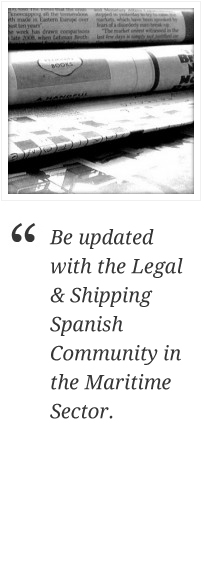November: CIRCULAR 4A/2000
STRICTER PORT CONTROLS BY THE SPANISH AUTHORITIES ON FOREIGN VESSELS
Several foreign vessels calling at Spanish ports have experienced detention problems due to the application of EU Directives to Spanish legislation and the resulting increase in port control by the Spanish authorities.
Following various incidents, all EU Governments are becoming increasingly concerned about sea disasters causing serious damage to the marine environment. They are therefore compiling more accurate regulations regarding environmental rules and focusing the legislation on stricter port controls to reinforce shipping safety and protect the environment.
This month, the Spanish government has published a regulation, Royal Decree 1828/2000, to tighten the controls on vessels calling at Spanish ports and ensure that ships comply with international standards. This regulation incorporates EU Directive 99/97/CE, and modifies the previous Spanish regulation, Royal Decree 768/1999, which incorporated EU Directive 98/25/CE.
Royal Decree 1828/2000 basically stipulates the following:
1)Â Â Â Â Â Foreign vessels which, amongst others, will primarily be subject to inspection:
- Vessels calling at Spanish Ports which have not been inspected in the last six months by another EU Port.
- Vessels over thirteen years old.
- Vessels calling at any Spanish Port for the first time or after twelve months.
- Vessels with a class certificate issued by a non recognised organisation.
- Vessels registered in a State with a higher than average number of immobilisations.
- Vessels that have been allowed to leave a EU Port under certain circumstances.
- Vessels that have been immobilised in a previous port of call.
- Vessels registered in a State with a higher than average level of deficiencies.
2)Â Â Â Â Â The General Directorate of the Merchant Marine will publish detailed information on vessels that have been immobilised either: a) in the last three months; or, b) more than once in the last twenty-four months.
The Spanish Authority in charge of inspecting the vessel in port will be the Inspectors of the Harbour Master’s office. The inspectors will check that the vessel has the required certificates and documentation and examine the general conditions, particularly the machinery, cabins and hygiene.
If the detected deficiencies seriously endanger safe navigation, health or the marine environment, the marine inspector will immobilise the vessel. This decision to immobilise the vessel can be appealed before the General Directorate of the Merchant Marine. It is important to note that the Authorities will have to avoid undue immobilisations or delays, or otherwise, the Owner or Charterer will be entitled to compensation.
When the inspection confirms a deficiency contravening a Convention and the vessel is immobilised, Sanction Proceedings will be instigated by the General Directorate of the Merchant Marine against the vessel. The sanction against the vessel could total up to Ptas. 500,000,000 and will automatically cover all the costs of the inspection.
The aim of this regulation is to increase control over the inspection of vessels entering Spanish Ports. It also establishes the publication of more accurate detailed information regarding vessels which have been immobilised. Another important point is that the Spanish Government is becoming increasingly concerned about the work and health conditions of the crew on board vessels calling at Spanish Ports.
Should any P&I insurance or assureds have any queries or problems related to vessel detentions or immobilisations at any Spanish Port, they should not hesitate to contact us.

